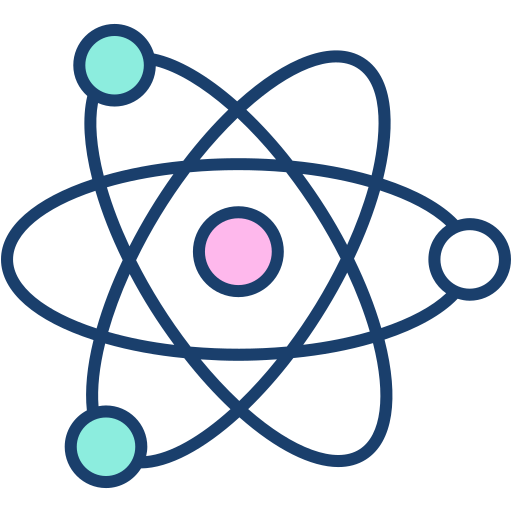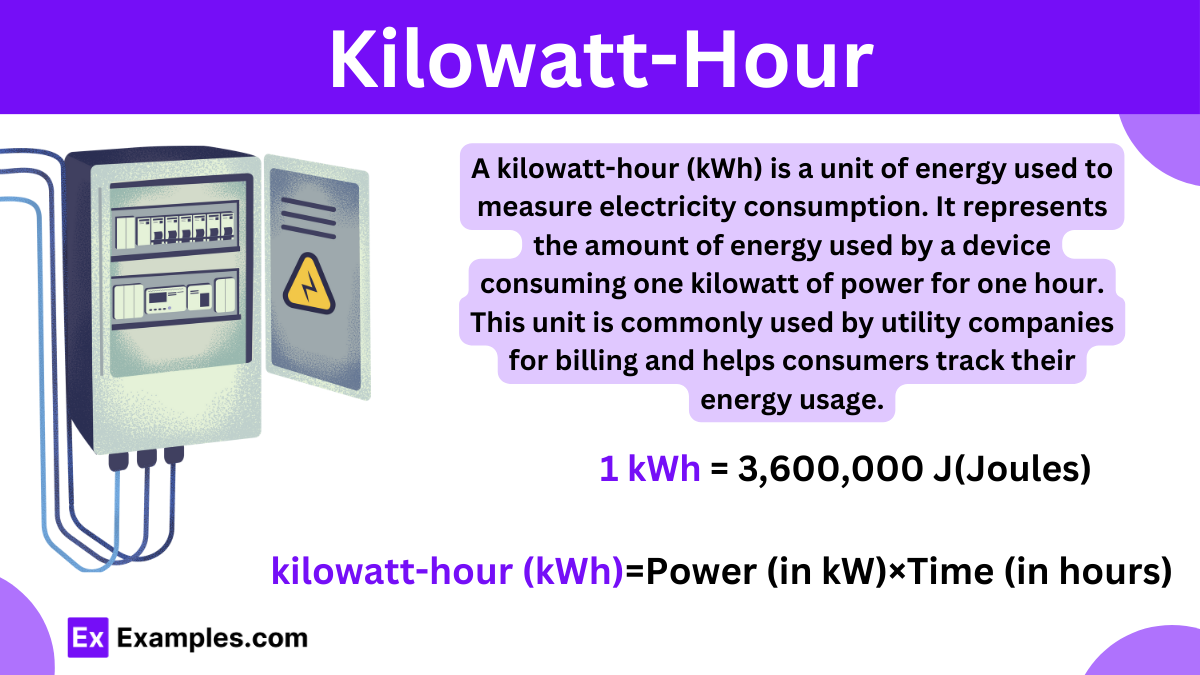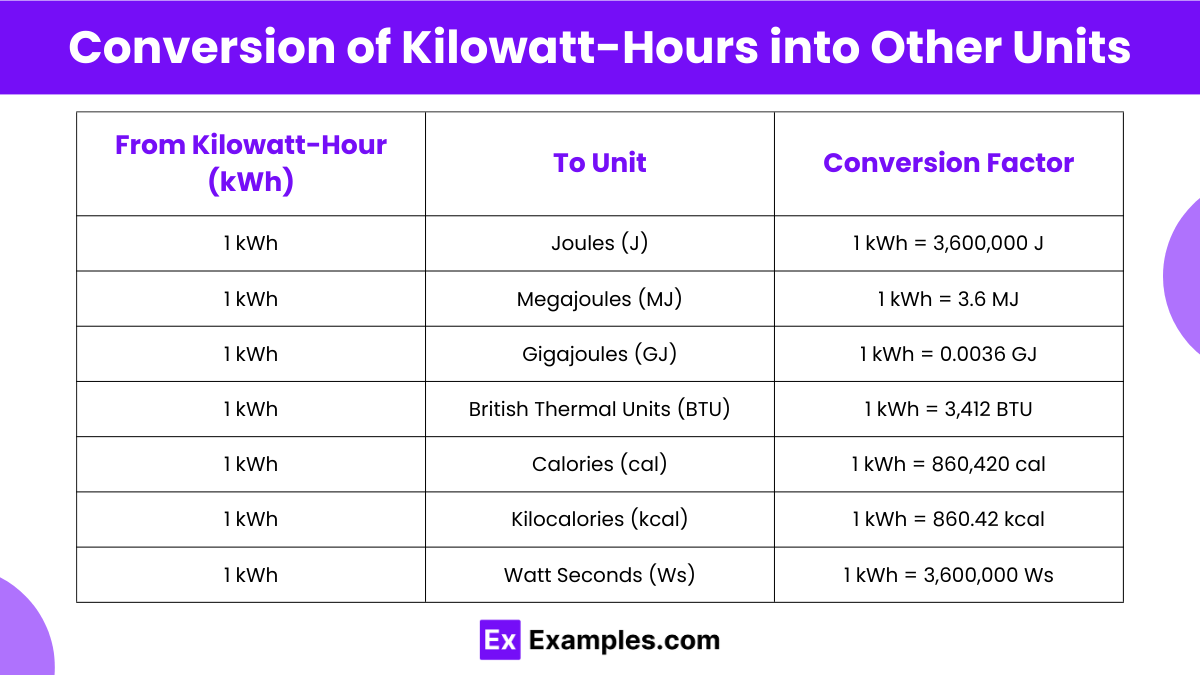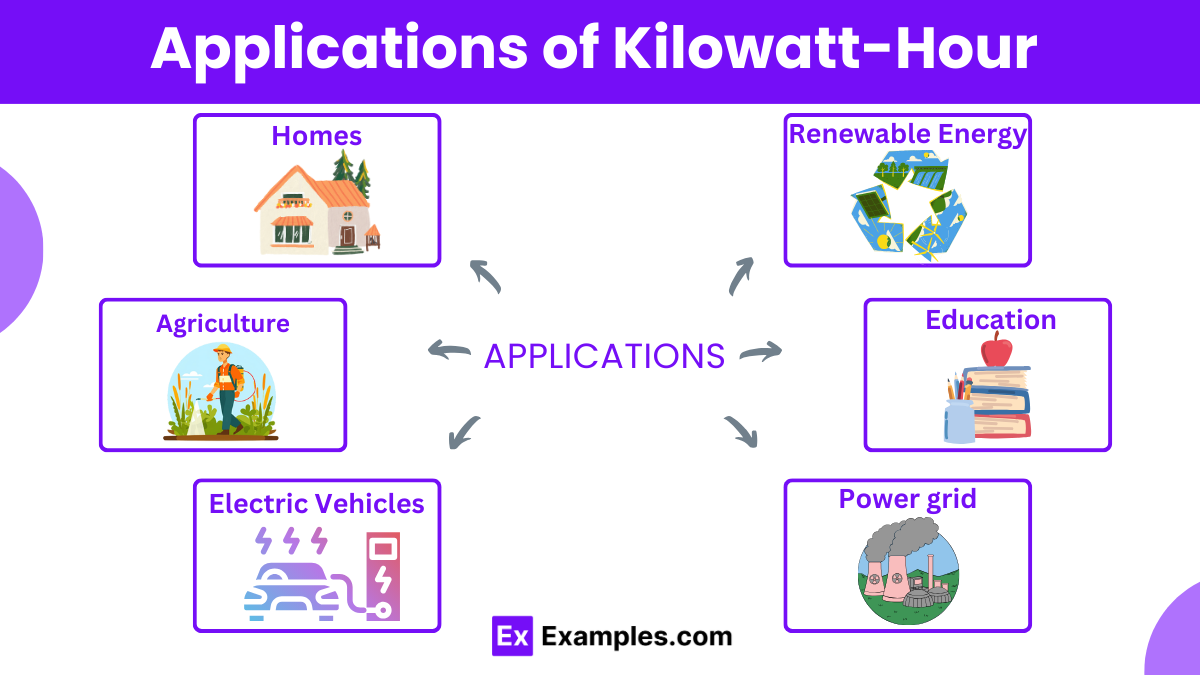How many joules are in one kilowatt-hour?
3.6 million joules
3.6 thousand joules
36 thousand joules
360 thousand joules


The formula to calculate kilowatt hours is straightforward:
kWh = Power (in kW)×Time (in hours)

Kilowatt-hours (kWh) can be converted into various other units of energy to facilitate different applications and comparisons. Below is a table that provides the conversion factors from kilowatt-hours to several commonly used energy units:
| From Kilowatt-Hour (kWh) | To Unit | Conversion Factor |
|---|---|---|
| 1 kWh | Joules (J) | 1 kWh = 3,600,000 J |
| 1 kWh | Megajoules (MJ) | 1 kWh = 3.6 MJ |
| 1 kWh | Gigajoules (GJ) | 1 kWh = 0.0036 GJ |
| 1 kWh | British Thermal Units (BTU) | 1 kWh = 3,412 BTU |
| 1 kWh | Calories (cal) | 1 kWh = 860,420 cal |
| 1 kWh | Kilocalories (kcal) | 1 kWh = 860.42 kcal |
| 1 kWh | Watt Seconds (Ws) | 1 kWh = 3,600,000 Ws |
To clearly understand the distinction between kilowatt-hours (kWh) and kilowatts (kW), the following table outlines the key differences based on unit type, definition, and usage:
| Attribute | Kilowatt-Hour (kWh) | Kilowatt (kW) |
|---|---|---|
| Unit Type | Energy | Power |
| Definition | Measures the total amount of energy consumed. | Measures the rate of energy use or generation. |
| Usage | Used to quantify energy consumption over time. | Used to specify power capacity of devices. |
| Example | If an appliance uses 3 kWh, it means the appliance has used three kilowatts of power continuously over one hour. | If an appliance is rated at 3 kW, it means the appliance can draw or generate 3 kilowatts of power at any moment. |
Calculating the kilowatt-hours (kWh) used by an appliance allows you to understand its energy consumption, which is helpful for managing electricity usage and costs. Here’s a simple step-by-step guide to determine the kWh usage of an appliance:
To see how much energy the appliance uses over longer periods, like a month or a year:

1. Homes: People use kWh to monitor their electricity usage at home. It helps them understand which appliances consume the most energy and how they can reduce their electricity bills.
2. Agriculture: Farmers utilize kWh to power irrigation systems, greenhouse lighting, and other agricultural equipment. Monitoring kWh usage helps optimize energy efficiency and reduce operational costs.
3. Renewable Energy: kWh is crucial for measuring the output of renewable energy sources like solar panels and wind turbines. It enables us to gauge the effectiveness of renewable energy installations and promote sustainable energy production.
4. Electric Vehicles: Electric vehicle owners rely on kWh to estimate their vehicle’s driving range and charging requirements. It helps them plan their journeys and optimize charging schedules for convenience and efficiency.
5. Education: kWh is used in educational settings to teach students about energy conservation, renewable energy technologies, and sustainable living practices. It fosters environmental awareness and encourages responsible energy usage among future generations.
6. Community Projects: Local communities utilize kWh data to support energy conservation initiatives, such as energy-efficient lighting upgrades, community solar projects, and neighborhood energy audits. It promotes collaboration and collective action towards a greener future.
Kilowatt-hours (kWh) measure the energy usage of household appliances. Here’s how much energy typical home devices use:
One kilowatt-hour is the amount of energy used if you keep an appliance that consumes 1 kilowatt of power running for one hour. It’s a standard unit for measuring electricity use, helping you understand how much energy your appliances use and what that might cost on your electric bill.
In terms of your electricity bill, 1 kilowatt-hour is often referred to as one “unit” of electricity. For instance, if your light uses 100 watts of power, it needs to run for 10 hours to use up 1 kWh, or one “unit” of energy.
Text prompt
Add Tone
10 Examples of Public speaking
20 Examples of Gas lighting
How many joules are in one kilowatt-hour?
3.6 million joules
3.6 thousand joules
36 thousand joules
360 thousand joules
What is the formula to calculate energy in kilowatt-hours?
Energy (kWh) = Power (kW) * Time (hours)
Energy (kWh) = Power (kW) / Time (hours)
Energy (kWh) = Power (W) * Time (seconds)
Energy (kWh) = Power (W) / Time (seconds)
If a 2 kW heater runs for 3 hours, how much energy does it use in kilowatt-hours?
5 kWh
6 kWh
7 kWh
8 kWh
How much energy in kilowatt-hours is used by a 100 W light bulb running for 10 hours?
0.1 kWh
1 kWh
10 kWh
0.01 kWh
What does the term "kilowatt-hour" measure?
Power
Time
Energy
Voltage
How many kilowatt-hours are used by a 60 W light bulb running for 100 hours?
3 kWh
4 kWh
5 kWh
6 kWh
If a household uses 900 kWh in a month, what is the average daily energy consumption in kilowatt-hours?
30 kWh
20 kWh
40 kWh
50 kWh
If a household uses 30 kWh of energy per day, how much energy is used in a month (30 days)?
900 kWh
800 kWh
1000 kWh
1100 kWh
How many kilowatt-hours are consumed by a 500 W device operating for 8 hours?
2 kWh
3 kWh
4 kWh
5 kWh
If electricity costs $0.15 per kWh, what is the cost to run a 2 kW air conditioner for 10 hours?
$2.00
$3.00
$3.50
$2.50
Before you leave, take our quick quiz to enhance your learning!

